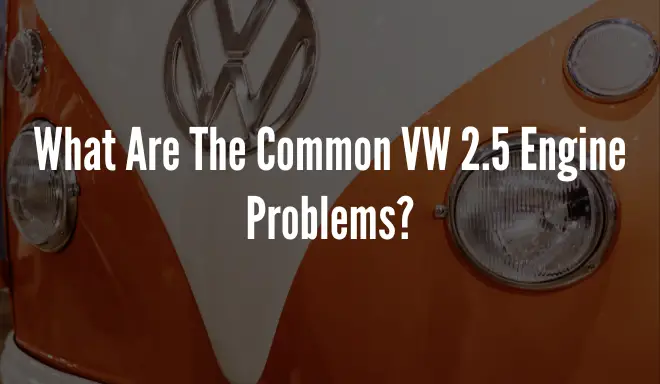If you’re a proud owner of a Volkswagen with a 2.5-liter engine, you might be wondering what common problems you should be on the lookout for.
In this article, we’ll explore the most frequent issues that VW 2.5 engines face.
From ignition coil failures to vacuum pump leaks, we’ll cover it all.
But don’t worry, these problems are not widespread and can be easily fixed.
We’ll also provide you with some tips on how to maintain your engine to prevent these issues from occurring.
So, buckle up, and let’s dive into the world of Common VW 2.5 Engine Problems!
What Are The Common VW 2.5 Engine Problems?
The Volkswagen 2.5 engine is known for its reliability, but there are still some issues that can arise.
Here are the six most common problems with the VW 2.5 engine:
-
Ignition coil failure
The ignition coil’s job is to turn the battery’s low voltage into high enough voltage to pass to the spark plugs to create combustion. Ignition coils can fail for many reasons: bad spark plug ignition cables, moisture intrusion, leaking valve covers, or improper spark plug gap. If the coils do happen to fail, 9 times out of 10, your engine will have a misfire in one of the five cylinders. Symptoms of Coil Pack Failure include engine misfires, lack of power, vehicle not starting, flashing or constant CEL illumination, and engine stalling. There isn’t a maintenance interval for ignition coils on these vehicles, but a general rule of thumb would be to change them every 40k – 60k miles.
-
Vacuum pump leaks
The vacuum pump is responsible for maintaining vacuum pressure in the brake booster. A leak in the vacuum pump can cause a loss of brake assist, which can lead to longer stopping distances and increased risk of accidents. Symptoms of Vacuum Pump Failure include a hard brake pedal, increased stopping distance, and a warning light on the dashboard.
Also Read: Why Is My Nissan Sentra Not Accelerating? Possible Reasons & Solutions
-
N80 valve failure
The N80 valve is part of the EVAP system, which is responsible for capturing fuel vapors from the fuel tank and storing them in a charcoal canister. The N80 valve can fail, causing the check engine light to come on and the engine to run poorly. Symptoms of N80 Valve Failure include a check engine light, rough idle, and poor acceleration.
-
PCV valve failure
The PCV valve is responsible for regulating the flow of gasses between the crankcase and the intake manifold. A failure of the PCV valve can cause oil leaks, decreased fuel economy, and increased emissions. Symptoms of PCV Valve Failure include oil leaks, decreased fuel economy, and increased emissions.
-
Serpentine belt rollers
The serpentine belt is responsible for driving the alternator, power steering pump, and air conditioning compressor. The rollers that guide the belt can wear out over time, causing the belt to slip or break. Symptoms of Serpentine Belt Roller Failure include a squealing noise from the engine, a loss of power steering, and a dead battery.
-
Stretched/skipped timing chain issues
The timing chain is responsible for synchronizing the rotation of the crankshaft and camshaft. A stretched or skipped timing chain can cause the engine to run poorly or not at all. Symptoms of Timing Chain Failure include a check engine light, rough idle, and poor acceleration.
What Are The Solutions to Fix VW 2.5 Engine Problems?

Here are the solutions to fix the six most common problems with the VW 2.5 engine:
- Ignition coil failure: If you experience any of the symptoms of ignition coil failure, such as engine misfires, lack of power, or flashing or constant CEL illumination, you should replace all your ignition coils and spark plugs. A general rule of thumb would be to change them every 40k – 60k miles.
- Vacuum pump leaks: If you experience any of the symptoms of vacuum pump failure, such as a hard brake pedal, increased stopping distance, or a warning light on the dashboard, you should replace the vacuum pump.
- N80 valve failure: If you experience any of the symptoms of N80 valve failure, such as a check engine light, rough idle, or poor acceleration, you should replace the N80 valve.
- PCV valve failure: If you experience any of the symptoms of PCV valve failure, such as oil leaks, decreased fuel economy, or increased emissions, you should replace the PCV valve.
- Serpentine belt rollers: If you experience any of the symptoms of serpentine belt roller failure, such as a squealing noise from the engine, a loss of power steering, or a dead battery, you should replace the rollers that guide the belt.
- Stretched/skipped timing chain issues: If you experience any of the symptoms of timing chain failure, such as a check engine light, rough idle, or poor acceleration, you should replace the timing chain.
What is the horsepower of VW 2.5 engine?
The VW 2.5 engine is a 5-cylinder engine that comes with a displacement of 2480 cc or 2.5 liters of fuel. It has a double overhead camshaft and four valves per cylinder. The power output of the VW 2.5 engine is 148 to 170 hp or 110 to 125 kW at 5000 to 5700 rpm.
How long does a VW 2.5 engine last?
The VW 2.5 engine is known for its reliability and can last between 150,000 to 200,000 miles with proper care. Regular oil changes are crucial for these engines due to their higher oil consumption.
Which VW engine is most reliable?
The 1.8L engine is considered to be one of the most reliable engines produced by Volkswagen. It is known for its durability and can last more than 100,000 miles with proper maintenance. Another reliable engine is the 2.0-liter TDI engine, which is known for its fuel efficiency and durability. However, it is important to note that no company can hit it out of the park every single time, and VW has made many excellent products as well as problematic models.
Is the VW 2.5 a 5-cylinder?
Yes, the VW 2.5 engine is a 5-cylinder engine. It is one of the most reliable engines produced by Volkswagen and is used in different VW models including the iconic Volkswagen Beetle and Jetta Mk5. The power output of this engine is a staggering 170 hp and torque can go up to 240 Nm. The VW 2.5 engine is quite reliable and users have responded positively in regards to its longevity and performance. Although it faces occasional issues like any other engine, a little bit of maintenance can ensure its longevity.
What is the difference between TDI and FSI?
TDI and FSI are two different types of engines produced by Volkswagen. TDI stands for turbocharged direct injection and is a diesel engine. FSI stands for fuel stratified injection and is a petrol engine.
The main difference between the two is the way fuel is injected into the engine. In TDI engines, fuel is injected directly into the combustion chamber, while in FSI engines, fuel is injected into the intake manifold.
TDI engines are known for their fuel efficiency and lower emissions. They are ideal for family-oriented cars and eco-conscious drivers. On the other hand, FSI engines offer better performance and are ideal for sports cars and enthusiasts.
It’s important to note that there is another type of engine called TFSI, which stands for turbocharged fuel stratified injection. It is a turbo version of the standard FSI engine and is used in VW Golf and Jetta.
Which VW models have a 1.8L engine?
The 1.8L engine is used in several Volkswagen models. Here are some of the models that have the 1.8L engine:
- Volkswagen Passat CC
- Volkswagen Passat B6
- Volkswagen Jetta Mk5/Sagitar
What kind of oil does a VW 2.5 take?
The VW 2.5 engine requires synthetic oil with a weight of 5W-40. The recommended oil type for a 2013 VW Jetta 2.5 is also a synthetic oil with a weight of 5W-40. It is important to note that the oil should be approved for VW and meet the VW specifications 502 00 and 505 00. The total capacity for an oil change with filter replacement is 6.3 U.S. quarts (or 6.0 liters).
FAQs
What is the VW 2.5 engine?
The VW 2.5 engine is a gasoline engine that was first introduced in 1991 to 1995 in the Volkswagen Eurovan. This engine didn’t make a return until 2005 and made up until 2014 in a number of different Volkswagen vehicles.
What are the most common problems with the VW 2.5 engine?
The most common problems that VW 2.5 engines face include ignition coil failures, vacuum pump leaks, and oil leaks.
How can I prevent these issues from occurring?
To prevent these issues from occurring, it’s important to maintain your engine properly. Regular oil changes, air filter replacements, and spark plug replacements can go a long way in keeping your engine healthy.
What are the symptoms of ignition coil failure?
Symptoms of ignition coil failure include engine misfires, lack of power, vehicle not starting, flashing or constant CEL illumination, and engine stalling.
What is the maintenance interval for ignition coils on VW 2.5 engines?
There isn’t a maintenance interval for ignition coils on these vehicles, but a general rule of thumb would be to change them every 40k – 60k miles.
What is the N80 valve failure?
The N80 valve is a component of the evaporative emissions control system. When it fails, it can cause a variety of issues, including rough idling, stalling, and poor fuel economy.
What are the symptoms of a vacuum pump leak?
Symptoms of a vacuum pump leak include a hard brake pedal, a decrease in power brake assist, and a check engine light.
What is the PCV valve failure?
The PCV (positive crankcase ventilation) valve is responsible for removing harmful gases from the engine’s crankcase. When it fails, it can cause a variety of issues, including rough idling, stalling, and poor fuel economy.
What are the symptoms of a stretched/skipped timing chain?
Symptoms of a stretched/skipped timing chain include a rough idle, a decrease in power, and a check engine light.
What are the serpentine belt rollers?
The serpentine belt rollers are components of the serpentine belt system. When they fail, they can cause a variety of issues, including a squealing noise, a decrease in power, and a check engine light.
Conclusion
In conclusion, the VW 2.5 engine is a reliable and efficient engine that has been used in a variety of Volkswagen vehicles.
While there are some common problems that these engines face, such as ignition coil failures, vacuum pump leaks, and oil leaks, these issues are not widespread and can be easily fixed with proper maintenance.
By following the recommended maintenance schedule, you can keep your engine running smoothly and avoid these issues altogether.
Regular oil changes, air filter replacements, and spark plug replacements can go a long way in keeping your engine healthy.
We hope that this article has provided you with valuable insights into the world of Common VW 2.5 Engine Problems.
Thank you for reading!




